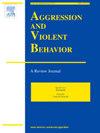Reducing antisocial behavior through cognitive training: A systematic review and meta-analysis
IF 3.4
2区 心理学
Q1 CRIMINOLOGY & PENOLOGY
引用次数: 0
Abstract
Cognitive deficits are a key risk factor for severe and persistent antisocial behavior (ASB); however, whether improving cognitive functioning reduces ASB remains unclear. To address this question, we conducted a systematic review and meta-analysis of cognitive training interventions among individuals displaying ASB.
We searched PubMed, PsycINFO, and Web of Science for studies published between 1990 and 2023. Of 529 records screened and 54 full-texts assessed, we identified 14 studies including a total of 601 participants (age M = 39.12, SD = 9.33, 84 % male). Most studies aimed at improving multiple cognitive domains. Cognitive training yielded moderate reductions in ASB (g = 0.59, p < .001 in pre-post studies; g = 0.36, p = .003 in controlled trials). Effect sizes were larger for interventions targeting social cognition. Cognitive improvements were moderate in pre-post studies (g = 0.51, p < .001) but non-significant in controlled trials (g = 0.11, p = .27).
Cognitive training holds promise as a complementary approach for reducing ASB, but greater theoretical and measurement precision is needed to elucidate the mechanisms driving behavioral change. Future research directions include anchoring interventions on cognitive models of ASB, aligning treatment and assessment targets, and evaluating treatment moderators, scalability, and transfer effects.
通过认知训练减少反社会行为:系统回顾和荟萃分析
认知缺陷是严重和持续的反社会行为(ASB)的一个关键风险因素;然而,改善认知功能是否会减少反社会行为仍不清楚。为了解决这个问题,我们对有 ASB 表现的个体进行了认知训练干预的系统回顾和荟萃分析。我们在 PubMed、PsycINFO 和 Web of Science 上检索了 1990 年至 2023 年间发表的研究。在筛选的 529 条记录和评估的 54 篇全文中,我们确定了 14 项研究,共涉及 601 名参与者(年龄 M = 39.12,SD = 9.33,84% 为男性)。大多数研究旨在改善多个认知领域。认知训练可适度减少 ASB(前后研究中 g = 0.59,p < .001;对照试验中 g = 0.36,p = .003)。针对社会认知的干预效果更大。在事后研究中,认知能力的改善是适度的(g = 0.51,p = .001),但在对照试验中,认知能力的改善并不显著(g = 0.11,p = .27)。认知训练有望成为减少 ASB 的补充方法,但需要更高的理论和测量精度来阐明行为改变的驱动机制。未来的研究方向包括根据 ASB 认知模型确定干预措施,调整治疗和评估目标,以及评估治疗调节因素、可扩展性和转移效应。
本文章由计算机程序翻译,如有差异,请以英文原文为准。
求助全文
约1分钟内获得全文
求助全文
来源期刊

Aggression and Violent Behavior
Multiple-
CiteScore
7.50
自引率
4.30%
发文量
63
期刊介绍:
Aggression and Violent Behavior, A Review Journal is a multidisciplinary journal that publishes substantive and integrative reviews, as well as summary reports of innovative ongoing clinical research programs on a wide range of topics germane to the field of aggression and violent behavior. Papers encompass a large variety of issues, populations, and domains, including homicide (serial, spree, and mass murder: sexual homicide), sexual deviance and assault (rape, serial rape, child molestation, paraphilias), child and youth violence (firesetting, gang violence, juvenile sexual offending), family violence (child physical and sexual abuse, child neglect, incest, spouse and elder abuse), genetic predispositions, and the physiological basis of aggression.
 求助内容:
求助内容: 应助结果提醒方式:
应助结果提醒方式:


